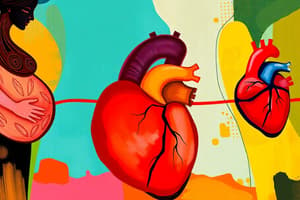Podcast
Questions and Answers
Which of the following changes are cardiovascular effects of epidural anesthesia and analgesia?
Which of the following changes are cardiovascular effects of epidural anesthesia and analgesia?
- Arterial vasodilation (correct)
- Reduced heart rate
- Increased systemic vascular resistance (SVR)
- Increased contractility
What factors can impact the expected cardiovascular effects of epidural anesthesia and analgesia?
What factors can impact the expected cardiovascular effects of epidural anesthesia and analgesia?
- The patient's age (correct)
- The type of local anesthetic used
- The number of blocked dermatomes
- The patient's hair color
Which nerve blocks can lead to more pronounced hemodynamic alterations during epidural anesthesia and analgesia?
Which nerve blocks can lead to more pronounced hemodynamic alterations during epidural anesthesia and analgesia?
- T1-T4 sympathetic fibers nerve blocks (correct)
- Lumbar epidural or low thoracic nerve blocks
- Sacral nerve blocks
- Cervical nerve blocks
Which of the following is a cardiovascular effect of epidural anesthesia and analgesia?
Which of the following is a cardiovascular effect of epidural anesthesia and analgesia?
Which of the following factors can complicate the clinical picture and impact the expected cardiovascular effects of epidural anesthesia and analgesia?
Which of the following factors can complicate the clinical picture and impact the expected cardiovascular effects of epidural anesthesia and analgesia?
Which of the following nerve blocks can lead to more pronounced hemodynamic alterations during epidural anesthesia and analgesia?
Which of the following nerve blocks can lead to more pronounced hemodynamic alterations during epidural anesthesia and analgesia?




